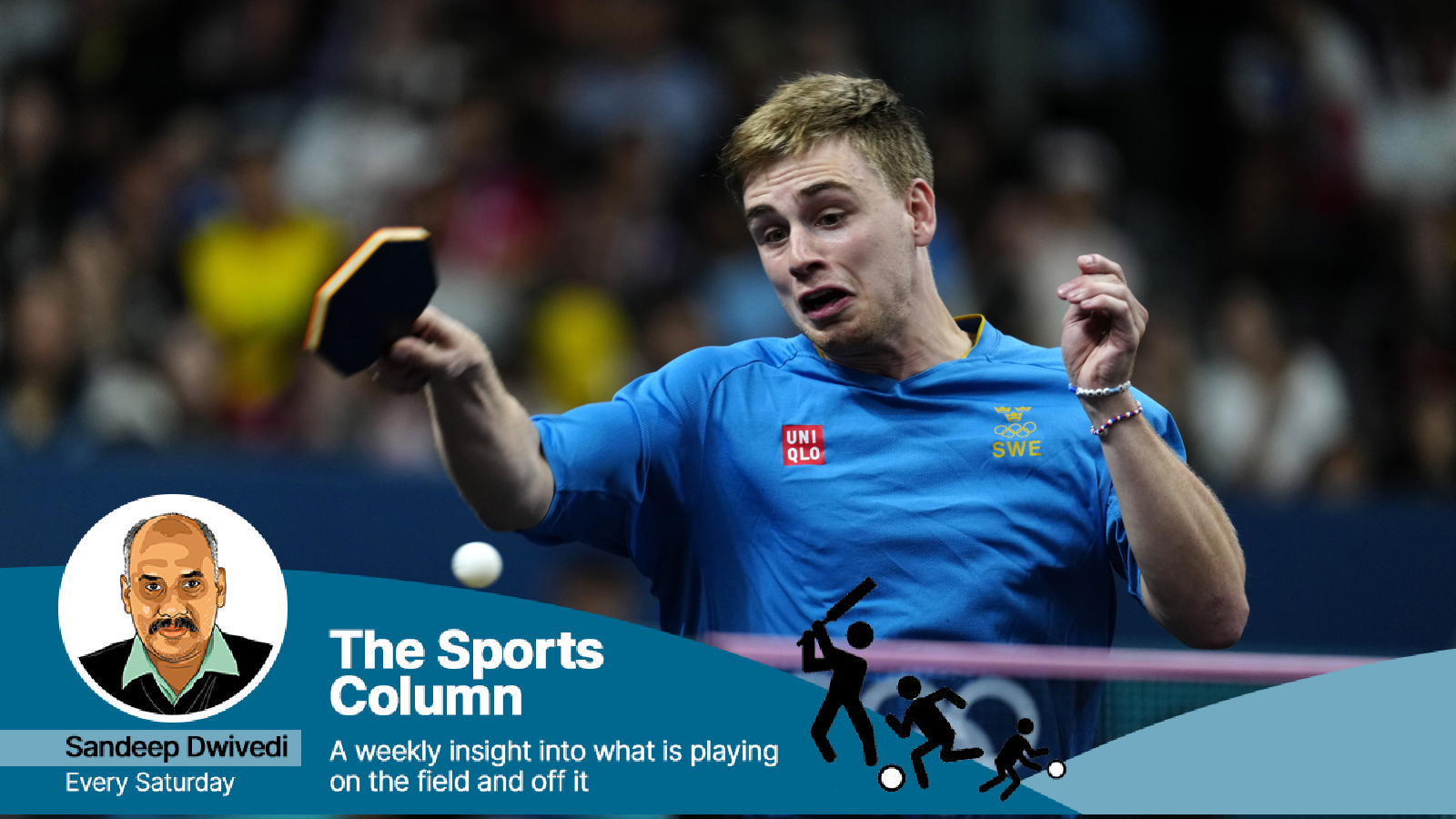The other night in Paris, a 22-year-old rookie knocked out the World No.1. Just another upset in the cut-throat competitive world of Olympics, you would say. Not really, since the giant who fell was from China, the giant-killer was a Swede, and the battle was at the table tennis venue. The two table tennis- obsessed nations have a past.
Wang Chuqin losing to Truls Moregardh in the Round of 32 was a result that would have shocked China and made them paranoid about history’s knack of repeating itself. Wang’s defeat meant China wouldn’t win both gold and silver men’s singles medals as they have done in the last four Olympics. So, was it the snapping of the streak that bothered China? Yes, it would have certainly wounded their pride, but the salt was the Swede.
This rare Chinese table tennis setback at the 2024 Games would have brought back tormenting memories of the late 1980s and early 1990s – the period when China’s long-running march since the 1960s had faced a temporary Swedish roadblock. Moregardh, meanwhile, would have reminded the Chinese of a handsome blond legend from Stockholm – Jan-Ove Waldner, the man who, back in the day, had tamed the dragon. He was someone who the Chinese hated once but later fell in love with. More about the change of a billion hearts later.
Waldner was the prime-plotter of Sweden’s 5-0 washout of China at the 1989 World Championship. In 1992, he would go on to win the Olympics gold. That was the period when the Chinese champions, holding their paddles like a pen, didn’t know what hit them. The Swede, with his conventional shakehand grip, was changing the game’s grammar.
Waldner would use every inch of the paddle to vary spin, worked out new angles, and his steps were measured. He played an energy-efficient game. Great serve and attack, great receive and attack. But Waldner’s biggest asset was his mind that could second-guess Chinese movements. He was known as the Mozart of table tennis, he was also its Pythagoras and Sigmund Freud.
The Swedish star also had ‘hawk eye’ vision, he could see what few could, former Swedish player and Waldner’s bio-grapher Jens Fellke shares.
The Waldner journey has an important India pit-stop. At the New Delhi World Championships in 1987, he beat two Chinese stars – Chen Longcan and Teng Yi – in the quarters and semi-finals. In the final, he met champion Jiang Jialiang, whom he lost to after a tough fight.
Fellke would bump into Waldner in the evening and would express regret at the missed opportunity for the world title. “I said something like this might be a chance that might never come again. J-O looked a little blankly at me, the lift doors on his floor clattered open and before he stepped out he said ‘It will’,” he would recall. Two years later, Waldner made good on his prediction, as he thrashed all the Chinese who crossed his path and went all the way.
Unusual inspiration
Around the time their paddlers were missing the podium, China was struggling to find its feet in the new world. The early 1990s was when the world was changing. The Soviet Union was collapsing and China was at a crossroads. And here was a lone Swede shaking the very pillar that unified the vast nation. China faced a dilemma. Should they change their ping-pong philosophy and play like Waldner?
In a brilliant essay in The Times, acclaimed writer and a table tennis Olympian Matthew Syed masterfully captures China’s confusion. His piece titled “Ping pong, China’s passion” was written in 2008, the year Beijing hosted the Olympics and opened the Iron Curtain.
He wrote about the question troubling China at that point and the possible answer that was staring the nation from across the table. “How could a nation with less than 10,000 participants withstand the might of a country with more than 200 million fanatics? … Central to the answer was Waldner,” he would write.
But how can they do it? “Since the 1950s, table tennis principles had been taught as if they were a branch of Mao’s infallible teachings … China was not merely unable to adapt but could not bring itself even to contemplate change.”
Syed writes how China’s then premier Deng Xiaoping identified the problem. “Chinese table tennis, like its moribund economy, was hamstrung by ideology.”
They needed Waldner clones to find their lost glory and a big shift did take place. “Waldner was no longer seen as a harbinger of foreign cultural imperialism but was embraced as a symbol of the new commitment to innovation,” Syed mentions.
China would embrace Waldner. Restaurants were named after him, international corporations would name him as their ambassador to push their business in China. Waldner would get a Chinese nickname. He would be called Lao Wa, translated as Old Waldner. Then the nation would go on to do the unthinkable – they would issue a postal stamp with a picture of the legend about to unleash his favourite serve. The Communist Party had given the go-ahead – young Chinese paddlers were watching, changing and improving.
In a classic irony, Kong Linghui, a paddler who had photocopied the Swede’s game, would defeat an ageing Waldner at the Sydney Games in 2000. Soon China would produce their own version of Waldner 2.0. An introverted kid from Anshan province would play the modern game and win two Olympics gold medals and be the World Champion three times. He is now considered the uncontested GOAT. Thanks to China’s mystical selection process, defending champ Ma Long, now 35, wasn’t considered for singles at the Paris Olympics, but kept under wraps for the team championship.
Paris will once again see a China vs Sweden final. After beating China’s No.1, Moregardh now meets their No.2 – Fan Zhendong. But somehow this isn’t a bitter rivalry. Call it Stockholm Syndrome or Lao Wa’s legacy.
Send feedback to sandydwivedi@gmail.com




